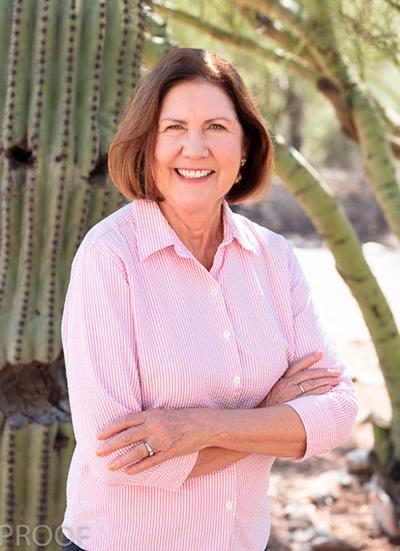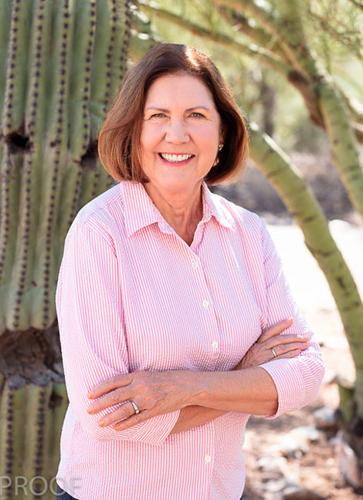Democrat Ann Kirkpatrick is seeking Southern Arizona’s Congressional District 2 seat. An attorney, Kirkpatrick previously represented Arizona’s Congressional District 1 seat and served in the Arizona Legislature. Her Republican opponent, Lea Marquez Peterson, has declined to be interviewed by Inside Tucson Business. This Q&A has been edited for clarity and length.
Would you have voted for the tax package that President Trump signed into law?
I would not have. No. Too expensive and there’s no plan to pay for it. I really am concerned about the deficit and I think it was a very reckless thing to do. After House Speaker Paul Ryan said, “We now need to look at Medicare and Social Security as a way to pay for this,” seniors are approaching me, really worried they’re going to lose their earned benefits of Social Security and Medicare.
Talk about Social Security. What do you see as a strategy to shore up the program?
When I was elected in 2008, Jim Kolbe approached me about being on a bipartisan committee of current and former members of Congress to address the budget and we were going to tackle three issue areas: Social Security, Medicare and the defense budget. So, we started with social security and there are couple other things we can do right away that puts it on a sustainable path. One, is to not index it on the CPI, but have a different index, not the chain index, but a different index that addresses how seniors spend their money. They spend it differently than middle-age families or young families. And then the second thing is to at least increase the cap on how much income is subject to Social Security taxes. Those two things would put it on a sustainable path and we were making good progress and then 2010 came and all the members on that committee lost their elections. And to my knowledge, it hasn’t been revived. I’d love to do it. It was great work. I think Jim Kolbe is just a wonderful person.
You voted in favor of the Affordable Care Act. You continue to support it, but what do you think the successes of the law had been and what needs to change to improve it?
I did vote for it and called it my proudest vote. I voted for it in spite of being told that if I did, I would lose my next election, which I did, but it was still the right thing to do and I hear from people every week who tell me, “Please don’t get rid of it.” In terms of improving it, we need to require Medicare to negotiate and insurance companies to negotiate prescription drug costs.
What about Medicare for All?
I support allowing people to buy into Medicare at any age as Medicare for All. It would solve some of the problems we have in Arizona in the counties where we only have one insurance carrier, and this will be a pretty easy way to give them another affordable choice.
What are your thoughts on the conversations about a border wall?
We don’t want a border wall in Southern Arizona. Even Republican business people tell me that. A third of our business comes from Mexico. We don’t want a wall.
What do you make of the president’s push to reform NAFTA?
I think it really should be done by Congress and it needs to be an open, transparent process. One of the problems I have with this administration is they’re not transparent. But I was pushing for an effort in Congress to look at a way to reform it that’s open and has participation from the American people. In Arizona, we really suffered from NAFTA and a lot of trade went to Mexico, from Arizona to Mexico. I think we’ve recovered somewhat, but I’m very leery on anything that comes from any administration.
What about the push to impose tariffs on trade with other nations?
Again, there’s not transparency in the administration. It’s a big issue. Historically, tariffs haven’t worked. There are always winners and losers, and the same with trade agreements.
What are your thoughts on the proposed Rosemont Mine?
I’m opposed to Rosemont. I’m not opposed to mining in general. I supported Resolution Copper, because that’s in the copper corridor where there’ve always been mining. I’m opposed to Rosemont, because it’s in an urban setting, and I’m really concerned about what it does to the water. But, very disappointed that the forces are moving along with the permitting.
Your opponent says you can’t understand Southern Arizona issues because you’re from Flagstaff. Talk about why you decided to come to Tucson and seek the congressional seat here.
Well, right out of high school, I came here on scholarship to the University of Arizona, got my undergrad degree. Then I taught school here for a couple of years, then went to law school here—was a clerk actually for Barbara Lawall, who’s the county attorney now, and for John Roll, who was killed in that January shooting in 2011. And then after law school, I worked in the Pima County Attorney’s Office. Got married here, had my first child at Tucson Medical Center. So when I first got into the race, I was taking on Martha McSally, and I had actually lived in Tucson longer than she had. We’ve tested carpetbagging in the polls, and it just doesn’t stick. I think a large part of that is because some many people have moved to Tucson from other places, and they just tell me, “Look, Ann here is Arizona as it gets, and that’s all we care about,” so it just hasn’t been an issue.
Are there any other issues that we hadn’t talked about today that you wanted to bring up?
Paid family leave is actually really important to me. Right after the 2016 election, my daughter, who was in residency here at UMC, gave birth to my second grandson a month early, and he had to be in the hospital for a little while. That thrusted me into the role of taking his then 18-month-old brother. I always tell people running a competitive senate campaign pales compared to running after an 18-month-old toddler. That’s why we moved down here, to be really close by, and I went over every single day last year to help. She and her husband were a position where they could take the time to go to the hospital with the baby, which is critical to the newborn. I asked them how many other parents were able to do that? I started researching it. A lot of times, women have to go back to work within three or four days of giving birth to a baby, and they don’t take the baby home with them. The baby stays in the hospital and it just expands and heightens a multitude of problems. Babies like that don’t thrive as well if they aren’t held constantly. That creates socialization problems, learning problems, for the rest of their lives. And every other modern country in the world has paid family leave except the United States.


